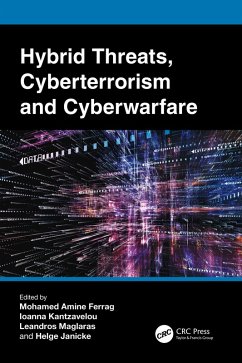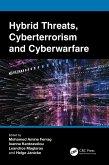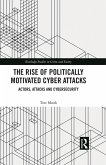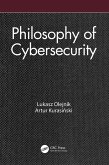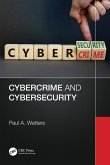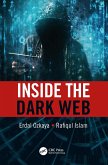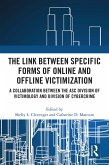Hybrid Threats, Cyberterrorism and Cyberwarfare (eBook, ePUB)
Redaktion: Ferrag, Mohamed Amine; Janicke, Helge; Maglaras, Leandros; Kantzavelou, Ioanna
50,95 €
50,95 €
inkl. MwSt.
Sofort per Download lieferbar

25 °P sammeln
50,95 €
Als Download kaufen

50,95 €
inkl. MwSt.
Sofort per Download lieferbar

25 °P sammeln
Jetzt verschenken
Alle Infos zum eBook verschenken
50,95 €
inkl. MwSt.
Sofort per Download lieferbar
Alle Infos zum eBook verschenken

25 °P sammeln
Hybrid Threats, Cyberterrorism and Cyberwarfare (eBook, ePUB)
Redaktion: Ferrag, Mohamed Amine; Janicke, Helge; Maglaras, Leandros; Kantzavelou, Ioanna
- Format: ePub
- Merkliste
- Auf die Merkliste
- Bewerten Bewerten
- Teilen
- Produkt teilen
- Produkterinnerung
- Produkterinnerung

Bitte loggen Sie sich zunächst in Ihr Kundenkonto ein oder registrieren Sie sich bei
bücher.de, um das eBook-Abo tolino select nutzen zu können.
Hier können Sie sich einloggen
Hier können Sie sich einloggen
Sie sind bereits eingeloggt. Klicken Sie auf 2. tolino select Abo, um fortzufahren.

Bitte loggen Sie sich zunächst in Ihr Kundenkonto ein oder registrieren Sie sich bei bücher.de, um das eBook-Abo tolino select nutzen zu können.
The book discusses and analyses current posture of cyberterrorism, cyberwarfare, and hybrid threats, sector specific cyber-attacks that have the form of cyberterrorism and presents the recent actions that EU, USA and other Nations have taken in order to strengthen their systems against such attacks.
- Geräte: eReader
- ohne Kopierschutz
- eBook Hilfe
- Größe: 1.04MB
Andere Kunden interessierten sich auch für
![Hybrid Threats, Cyberterrorism and Cyberwarfare (eBook, PDF) Hybrid Threats, Cyberterrorism and Cyberwarfare (eBook, PDF)]() Hybrid Threats, Cyberterrorism and Cyberwarfare (eBook, PDF)50,95 €
Hybrid Threats, Cyberterrorism and Cyberwarfare (eBook, PDF)50,95 €![The Lazarus Heist (eBook, ePUB) The Lazarus Heist (eBook, ePUB)]() Geoff WhiteThe Lazarus Heist (eBook, ePUB)10,99 €
Geoff WhiteThe Lazarus Heist (eBook, ePUB)10,99 €![The Rise of Politically Motivated Cyber Attacks (eBook, ePUB) The Rise of Politically Motivated Cyber Attacks (eBook, ePUB)]() Tine MunkThe Rise of Politically Motivated Cyber Attacks (eBook, ePUB)43,95 €
Tine MunkThe Rise of Politically Motivated Cyber Attacks (eBook, ePUB)43,95 €![Philosophy of Cybersecurity (eBook, ePUB) Philosophy of Cybersecurity (eBook, ePUB)]() Lukasz OlejnikPhilosophy of Cybersecurity (eBook, ePUB)46,95 €
Lukasz OlejnikPhilosophy of Cybersecurity (eBook, ePUB)46,95 €![Cybercrime and Cybersecurity (eBook, ePUB) Cybercrime and Cybersecurity (eBook, ePUB)]() Paul A. WattersCybercrime and Cybersecurity (eBook, ePUB)49,95 €
Paul A. WattersCybercrime and Cybersecurity (eBook, ePUB)49,95 €![Inside the Dark Web (eBook, ePUB) Inside the Dark Web (eBook, ePUB)]() Erdal OzkayaInside the Dark Web (eBook, ePUB)51,95 €
Erdal OzkayaInside the Dark Web (eBook, ePUB)51,95 €![The Link between Specific Forms of Online and Offline Victimization (eBook, ePUB) The Link between Specific Forms of Online and Offline Victimization (eBook, ePUB)]() The Link between Specific Forms of Online and Offline Victimization (eBook, ePUB)41,95 €
The Link between Specific Forms of Online and Offline Victimization (eBook, ePUB)41,95 €-
-
-
The book discusses and analyses current posture of cyberterrorism, cyberwarfare, and hybrid threats, sector specific cyber-attacks that have the form of cyberterrorism and presents the recent actions that EU, USA and other Nations have taken in order to strengthen their systems against such attacks.
Dieser Download kann aus rechtlichen Gründen nur mit Rechnungsadresse in A, B, BG, CY, CZ, D, DK, EW, E, FIN, F, GR, HR, H, IRL, I, LT, L, LR, M, NL, PL, P, R, S, SLO, SK ausgeliefert werden.
Produktdetails
- Produktdetails
- Verlag: Taylor & Francis eBooks
- Seitenzahl: 202
- Erscheinungstermin: 22. November 2023
- Englisch
- ISBN-13: 9781000983241
- Artikelnr.: 69083240
- Verlag: Taylor & Francis eBooks
- Seitenzahl: 202
- Erscheinungstermin: 22. November 2023
- Englisch
- ISBN-13: 9781000983241
- Artikelnr.: 69083240
- Herstellerkennzeichnung Die Herstellerinformationen sind derzeit nicht verfügbar.
Dr. Mohamed Amine Ferrag received the Bachelor's, Master's, Ph.D., and Habilitation degrees in computer science from Badji Mokhtar-Annaba University, Annaba, Algeria, in June 2008, June 2010, June 2014, and April 2019, respectively. From 2014 to 2022, he was an Associate Professor at the Department of Computer Science, Guelma University, Algeria. From 2019 to 2022, he was a Visiting Senior Researcher with the NAU-Lincoln Joint Research Center of Intelligent Engineering, Nanjing Agricultural University, China. Since 2022, he has been the Lead Researcher at Artificial Intelligence & Digital Science Research Center, Technology Innovation Institute, Abu Dhabi, United Arab Emirates. His research interests include wireless network security, network coding security, applied cryptography, blockchain technology, and AI for cyber security. He has published over 120 papers in international journals and conferences in the above areas. He has been conducting several research projects with international collaborations on these topics. He was a recipient of the 2021 IEEE TEM Best Paper Award as well as the 2022 Scopus Algeria Award. He is featured in Stanford University's list of the world's Top 2% scientists for the years 2020, 2021, and 2022. He is a Senior Member of the Institute of Electrical & Electronic Engineers (IEEE) and a member of the Association for Computing Machinery (ACM). Dr. Ioanna Kantzavelou is an Assistant Professor at the Dept. of Informatics and Computer Engineering at the School of Engineering of the University of West Attica. She received a B.Sc. in Informatics from the Dept. of Informatics of the Technological Educational Institute of Athens, an MSc by Research in Computer Security from the Dept. of Computer Science at the University College Dublin of the National University of Ireland, and a Ph.D. on Intrusion Detection in Information Technology Security from the Dept. of Information and Communication Systems Engineering of the University of the Aegean. She has worked in R&D projects funded by the Greek government, the Irish government, and the EU. Her published work includes chapters in books (IOS Press), conferences and journals, recording remarkable citations in her research work. She has joint editorship of three IOS Press collections. She has been a repetitive reviewer in many international conferences, such as ACM SEC, IEEE TrustCom, IFIP SEC, ESORICS, IEEE CIS, and she is currently a reviewer for high-ranking journals, of IEEE, Elsevier, Springer, and Emerald. She is a member of the Greek Computer Society (GCS), of the ACM and of the IEEE Computer Society. Prof. Leandros A. Maglaras is a professor of cybersecurity in the School of Computing at Edinburgh Napier University. From September 2017 to November 2019, he was the Director of the National Cyber Security Authority of Greece. He obtained a B.Sc. (M.Sc. equivalent) in Electrical and Computer Engineering from the Aristotle University of Thessaloniki, Greece in 1998, M.Sc. in Industrial Production and Management from the University of Thessaly in 2004, and M.Sc. and Ph.D. degrees in Electrical & Computer Engineering from the University of Thessaly, in 2008 and 2014 respectively. In 2018 he was awarded a Ph.D. in Intrusion Detection in SCADA systems from the University of Huddersfield He is featured in Stanford University's list of the world's Top 2% scientists. He is a Senior Member of the Institute of Electrical & Electronics Engineers (IEEE) and is an author of more than 200 papers in scientific magazines and conferences. Prof. Helge Janicke is the Research Director of the Cyber Security Cooperative Research Centre, Australia. He is affiliated with Edith Cowan University and holds a visiting Professorship in Cyber Security at De Montfort University, UK. Prof. Janicke's research interests are in the area of cyber security, in particular with applications in critical infrastructures using cyber-physical systems, SCADA and Industrial Control Systems. Prof. Janicke's current research investigates the application of Agile Techniques to Cyber Incident Response in Critical Infrastructure, Managing Human Errors that lead to Cyber Incidents, and research on Cyber warfare & Cyber peacekeeping. Prof. Janicke established DMU's Cyber Technology Institute and its Airbus Centre of Excellence in SCADA Cyber Security and Forensics Research. He has been the Head of School of Computer Science at De Montfort University UK, before taking up his current position as Research Director for the Cyber Security Cooperative Research Centre. Prof. Janicke founded the International Symposium on Industrial Control System Cyber Security Research (ICS-CSR) and contributed over 150 peer reviewed articles and conference papers to the field that resulted from his collaborative research with industry partners such as Airbus, BT, Deloitte, Rolls-Royce, QinetiQ, and General-Dynamics.
1. Cyberwarfare in the Modern World Spyridon Sampanis, Melina - Eleftheria Spiliopoulou, Ioanna Kantzavelou and Leandros Maglaras. 2. The Geopolitics of 5G and EU Digital Sovereignty Andrew N. Liaropoulos. 3. From Rules to Retribution: The Problem of Attribution and Regulation in the Age of Cyber-Warfare Nathan Downes and Leandros Maglaras. 4. Cyberterrorism: A New Wave of Terrorism or Not? Eleni Kapsokoli. 5. Machine Learning-Based TCP Congestion Control Strategies for Cyberterrorism Active Defense on Smart Grids
Konstantinos Demertzis, Dimitrios Taketzis, Charalabos Skianis, Panayotis Kikiras, and Lazaros Iliadis. 6. Speed2 Comes True: Cyberattacks Against Ships Georgios Kavallieratos and Sokratis Katsikas. 7. Cyberwarfare in Ukraine: Incidents, Tools and Methods Komninos Theodoros and Serpanos Dimitrios. 8. Cyber-Security Vulnerability and Risk of Industrial Control Systems
John M.A. Bothos and Vasileios Vlachos. 9. Cyber Warfare and Cyber Terrorism: What is the Critical Difference? Pete Wilkinson and Leandros Maglaras.
Konstantinos Demertzis, Dimitrios Taketzis, Charalabos Skianis, Panayotis Kikiras, and Lazaros Iliadis. 6. Speed2 Comes True: Cyberattacks Against Ships Georgios Kavallieratos and Sokratis Katsikas. 7. Cyberwarfare in Ukraine: Incidents, Tools and Methods Komninos Theodoros and Serpanos Dimitrios. 8. Cyber-Security Vulnerability and Risk of Industrial Control Systems
John M.A. Bothos and Vasileios Vlachos. 9. Cyber Warfare and Cyber Terrorism: What is the Critical Difference? Pete Wilkinson and Leandros Maglaras.
1. Cyberwarfare in the Modern World Spyridon Sampanis, Melina - Eleftheria Spiliopoulou, Ioanna Kantzavelou and Leandros Maglaras. 2. The Geopolitics of 5G and EU Digital Sovereignty Andrew N. Liaropoulos. 3. From Rules to Retribution: The Problem of Attribution and Regulation in the Age of Cyber-Warfare Nathan Downes and Leandros Maglaras. 4. Cyberterrorism: A New Wave of Terrorism or Not? Eleni Kapsokoli. 5. Machine Learning-Based TCP Congestion Control Strategies for Cyberterrorism Active Defense on Smart Grids
Konstantinos Demertzis, Dimitrios Taketzis, Charalabos Skianis, Panayotis Kikiras, and Lazaros Iliadis. 6. Speed2 Comes True: Cyberattacks Against Ships Georgios Kavallieratos and Sokratis Katsikas. 7. Cyberwarfare in Ukraine: Incidents, Tools and Methods Komninos Theodoros and Serpanos Dimitrios. 8. Cyber-Security Vulnerability and Risk of Industrial Control Systems
John M.A. Bothos and Vasileios Vlachos. 9. Cyber Warfare and Cyber Terrorism: What is the Critical Difference? Pete Wilkinson and Leandros Maglaras.
Konstantinos Demertzis, Dimitrios Taketzis, Charalabos Skianis, Panayotis Kikiras, and Lazaros Iliadis. 6. Speed2 Comes True: Cyberattacks Against Ships Georgios Kavallieratos and Sokratis Katsikas. 7. Cyberwarfare in Ukraine: Incidents, Tools and Methods Komninos Theodoros and Serpanos Dimitrios. 8. Cyber-Security Vulnerability and Risk of Industrial Control Systems
John M.A. Bothos and Vasileios Vlachos. 9. Cyber Warfare and Cyber Terrorism: What is the Critical Difference? Pete Wilkinson and Leandros Maglaras.
